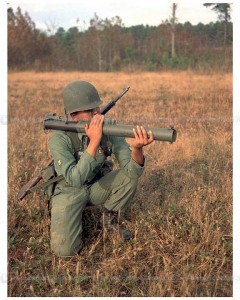Mike Jastrzebski's Blog, page 106
October 14, 2010
Clean Water, Clean Wake
Today's blog post is is going to be a little different for us here at Write on the Water. I want to invite you to take part in a bigger online conversation that is going on around the world on this day, October 15, 2010. Today is Blog Action Day 2010, a day when thousands of bloggers from over 130 countries all blog about the same issue: clean water.
Blog Action Day 2010: Water from Blog Action Day on Vimeo.
As soon as I heard about this, I knew I wanted to be a part of it. I thought, hey, the subjects here are writing (the power of the pen) and water. Here at Write on the Water, we're a natural for this one, right?
When I get up in the morning and brush my teeth, drink a glass of water or dive overboard for a swim, I take each of those actions for granted. But not everyone can do those things safely.
The story of charity: water – The 2009 September Campaign Trailer from charity: water on Vimeo.
According to the Blog Action Day 2010 website, every year about 1.5 million children under the age of 5 die from drinking unsafe drinking water. Bacteria-laden water and lack of basic sanitation kills more people every year than all forms of violence, including war.
This past July, the United Nations declared the access to clean water and sanitation was a basic human right.
Water certainly matters to me because I write on the water, live on the water, swim in the water, play in the water.
Interesting Ocean facts from savethesea.org
The oceans occupy nearly 71% of our planet's surface
More than 97% of all our planet's water is contained in the ocean
The top ten feet of the ocean hold as much heat as our entire atmosphere
The average depth of the ocean is more than 2.5 miles
The oceans provide 99 percent of the Earth's living space- the largest space in our universe known to be inhabited by living organisms
Less than 10% of this living space has been explored by humans
Death and disease caused by polluted coastal waters costs the global economy $12.8 billion a year.
Eighty per cent of all pollution in seas and oceans comes from land-based activities.
I know for certain that this liveaboard lifestyle makes us consume far less energy than the suburban lifestyle does and I have heard groups of boaters talking about how all ocean pollution should be blamed on cars and agriculture run-off and industrial waste, etc.
I am a member of the Seven Seas Cruising Association. The SSCA Motto is -
We always leave a clean wake.
The point of Blog Action Day is to get people thinking and talking about the issue of clean water. I certainly believe in the power of one person to change the way things are. What is it that we as individuals can do to contribute to this cause of clean water for all?
Fair winds!
Christine
October 13, 2010
Living with a writer-a wife's perspective
By Mary Jastrzebski
Mike asked me a few days ago if I wanted to write a blog giving the spouse's perspective on living with a writer, and I responded initially 'I don't think so' since my only writing experience was writing matter of fact investigative reports for my previous job – plus that was over 8 years ago. But when he woke up this morning and told me he had a dream that Christine also asked me to write a blog, I figured he really has this on his mind, so I decided to give it a try. Perhaps this is one of the secrets to living with a writer – being willing to step out of my comfort box to do something different that he'd like me to do.
Elmore Leonard once told me in an on-line chat that I was a 'saint' for wanting to support my husband's writing efforts. Witnessing my husband achieve his lifelong dream of writing and selling books is, in itself, most important to me, but I can't deny that I have a few selfish reasons for backing his work. I decided when I was about 23 years old – after backpacking through Europe and several road trips across the United States – that my goal in life was to see and experience the world and to just have fun along the way. Since moving onto the boat I've discovered that cruising offers a unique and interesting way to travel. And I find that overall; the cruising community is a fun loving lot of folks – even under adverse conditions.
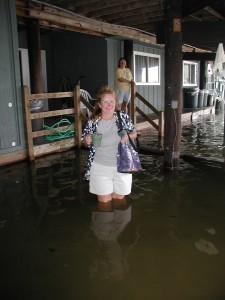
It's also become clear to me from Mike's experience and the many authors he's introduced me to that writing takes a lot of time, patience and persistence. So it only makes sense to me that if I'm supportive and patient enough to allow Mike to do what he has to do to write and sell books, any income generated from those sales will contribute to our retirement kitty to keep the boat afloat, feed us and the dog, and keep us cruising until we get tired of it. I am positively thrilled that since June he has been selling books every day. Patience and support have definitely proved to be key ingredients to making the whole process work.
I also enjoy proofreading Mike's work. It's fun to see the story created and have it unfold before my eyes, and I love how it's transformed into something even better with every re-write. I will admit at times it's challenging for me to provide constructive feedback, but in essence it's not unlike sailing a boat – there is always something new to learn.
Mike wrote last week that since I've been home recuperating from my surgery and back injury that I've distracted him from writing. I guess one more secret, especially on a small boat, is giving him his space. That's why I'm sitting outside on a chaise lounge by the pool writing this, under the palm trees swishing in the soft breeze, alongside the brightly blooming birds of paradise, on this positively perfect 78 degree day – hey – maybe this writing thing isn't so bad after all!
I'd be curious to hear from other partners in writing about their roles in their writer's life.
October 12, 2010
Spare Parts, Guns & Money
With more and more friends readying for extended cruising, I've been paying greater attention to what's required when outfitting the boat for a months-on-end voyage. Solar panels, spare engine parts, back-up electronics, cash kept in a waterproof container – it all makes sense if you're going to hoist the sails and live independently. But recently I've come upon one more item that sailors are increasingly taking to sea: guns.
A few weeks back I was spending some idle time watching Ship Shape TV. For those of you who were otherwise tuned in to Dancing with the Stars, NCIS, or The Office, Ship Shape TV is a half hour show that covers boat maintenance and repair – exciting stuff like fiberglass touch-up or canvas repair. As I sat back to watch my 30 minutes of maritime bliss I almost fell out of my chair. The show's host, the affable John Greviskis, started the segment by emerging from the cabin of his 25-foot runabout with a 12-gauge Mossberg pump in hand. The rest of the show went into the details about what kind of weaponry you should bring aboard to fend off pirates. I knew about the Somalians and I've heard occasional accounts of drug couriers taking over yachts in the Caribbean, but now I'm thinking the bad guys must now be a hell of a lot closer to home if we're loading up on ammo in 25-footers.
My interest in this subject is more than a passing fancy. As a mystery writer, I've had my protagonist fight off criminals with onboard weapons ranging from a flare gun to a wrench. I suppose knowing that boaters are arming-up their watercraft makes things easier for me going forward. (I can see the scene developing now – Steve Decatur left the helm and reached forward around the bulkhead for the sawed-off pump, but opted for his M72 Bazooka instead). And it doesn't seem that verisimilitude – a big word for keeping things real – is going to hold me back on this one. The word is, some big yachts actually keep a weapons stash designed to match military assaults.
(A member of the yacht club in practice attire with his M72 just before heading to the islands for the winter.)
So as I watched John Greviskis with great care I learned some lessons about guns and boating. First: a pistol aboard a boat isn't very practical as they aren't accurate over much distance on the bobbing sea; second, a shotgun is a good alternative, but you want to go with a deer slug rather than birdshot; third, aim low and fire just below the waterline with the intent of putting a hole or two in the hull of the offending craft. Good advice, maybe. But I don't expect to be arming-up when I set sail. This doesn't have anything to do with personal views about gun lobbies or the Second Amendment; it has to do with me. Quite simply, nobody who knows me would suggest that I carry a firearm on a boat. Hell, I'm deadly enough walking around with a fishing pole and a treble hook (although I'm usually the victim – you ever try to get a big-barded hook out of your knee? I have, but trust me, it's worse when it's in the palm of your hand.)
Mind you, it's not that I'm incapable of carrying a gun. I was twelve years old when my dad taught me to shoot. But a walk in the woods is different than rocking among the waves on the high seas. I can see it now: I lash the helm to run below, in the panic I stub my foot on the way down, jam my hand as I try to pull the gun from the cramped storage locker, and discharge my first shot in the process. Next, I jam my hand again, this time breaking some fingers as I try to seal the below-the-waterline hole I just blasted through the hull. I then run up the ladder to the cockpit with the 12-gauge in hand and discharge a second shot in the process, taking down the top of the mast. Now I'm ready. I pull the damn thing up to my shoulder and turn to sight-in my target only to realize that it's only someone who wanted to get a better look at an old wooden boat.
Now don't get me wrong. I wouldn't want to be facing down bad guys on the water without some kind of protection. About fifteen years ago I was in a boat off Nevis when a good-sized Whaler approached with two men standing near the bow with automatic weapons at their side. As they drew closer it was evident that it was a government boat – not that I took much comfort in that fact. I understand the threat. It's just that I better understand the threat within.
For now, then, I'll be leaving conventional weapons in port. But watch out pirates, I throw a mean winch handle, I can fire a flare gun with ease, and I can gybe the boom around with the best of them. And like old Joshua Slocum I just might lay some tacks out on the deck at night to give any unannounced intruders a prickly surprise if they opt to jump aboard. And if I have this wrong and it turns out that I have underestimated the enemy I'll be in some faraway port in the spirit of that wonderful songwriter Warren Zevon, writing, Send Lawyers, Guns, and Money.
Here a Muse, there a Muse . . .
By Michael Haskins
I sit and stare at the screen that holds two pages of the chapter I can't seem to finish, even though I know what happens. I have never had this problem before. Oh, I've been stuck because I'd written myself into a situation I couldn't get out of. But not this time. I know where it's going, but that ever-important next sentence won't come.
It's Friday and I am afraid to face the computer screen. Key West has been my Muse for more than 13 years and she has blessed me. Where is my Muse now? Is this a form of depression? Is there a Muse pill I can take? Is there a shrink who can explain why she left and let me know if she'll come back?
I escape to my refuge, the Hog's Breath Saloon, in Old Town. Everyone's friendly. Bruce Issacson is playing alone for the second time since Red died from a heart attack. Many local musicians will show up and sit in with Bruce. We all loved Red. He and Tim Carter are the best fiddlers that came here. I would've paid money to watch Red and Tim fiddle together. It won't happen, now.
I sit with my back to the parking lot, the stage to my left. Boston Frank is the bartender and he brings me a Jameson on the rocks.
"Can I have bottled water, Frank?" I ask, taking the drink.
Frank brings me the water and an ashtray. I smile my thank you and listen to Bruce as he tunes up, alone on a small stage and he looks small, up there alone. Locals have filled the outdoor area and yell encouragement to him.
This is a refuge because I observe talk and characteristics in people – locals and tourists – that will find their way into my writing. I make notes as some half-drunk tourist tries to pick up a girl. She's with friends and I wonder what would happen if he were successful. I make a note on the page: what would happen if . . .
There's a guy across the bar I'm watching. He inhales his cigarette smoke, exhales, takes a sip of beer, and then scratches his nose. Does the beer tickle him? He does it each time he drinks. Inhale, exhale, drink, scratch.
Another guy sits with his back to the bar and stares into the parking lot. Who is he waiting for? His wife, a girlfriend, a buddy with money from the ATM? He fondles his beer bottle and sips. He's wearing an obscene T-shirt from one of the Israeli T-shirt shops on Duval Street.
I make notes on all this.
"No cigar," Frank asks, noticing no cigar and that my drink appears untouched because the ice has melted and replaced what little I drank. "Is it Lent already?"
During Lent, I often give up either drinking or cigars. One year I gave up both. Friends told me later that I was a holy terror for 40-days and 40-nights! I thought I'd done well. I can give up drinking easier than giving up my cigars, but today, without my Muse, and maybe with writers' block, I had no desire for either. I wanted to write.
"Naw, Frank, I'm tryin' to keep a clear mind for the weekend," I lie.
"I'm in the next book, right?"
"You're in the first one," I lie again.
He smiles and leaves to wait on a customer.
"Finding characters?" Art, the manager asks, as he stands behind me and looks at my notebook.
"Something like that. How's the writing going?"
A few months back, Art read one of my short stories and decided if I could write and drink at the Hog, he could probably write better than me.
"I think I have writers' block," he frowns and sits down. "You ever get it?"
"Not me." I assure him.
"I just can't get my idea from my head to the computer screen."
"Finger exercises," I say and drum my fingers on the bar as if I was typing. "It loses them up."
"Really?" Art types on the bar.
"That and read and work on your notes."
"Not enough time in the day," he says and types. "Puts a little feeling into the fingers."
"Exactly," I say and smile.
"You make it look easy," he says slowly. He stops typing. "You've got one book published and you're second one is coming out. I don't know how you do it. Where do you find the time?"
"You make it," I grin. "You get up an hour early, you take your notebook to lunch, you skip your favorite TV show at night. You do it, because it's more important than sleep or food or TV."
"Sounds like you give up life," Art mumbles. "I didn't know about all that."
"You trade one life for another, Art. But, if you need to think about it, maybe it's not what you're supposed to do," I tell him. "If writing isn't what drives you, you're not a writer. It's not about sales – though sales are good – it's about writing, turning that idea in your head into words."
"I won't bother you," he says and stands up. "I know how important those notes are. Thanks for the advice." He walks away.
I put money on the bar and walk out through the T-shirt shop. I want to go home and write. I'd find her, my Muse, she was just playing hard to get, but I'd find her.
October 10, 2010
Big boat envy.
By Mike Jastrzebski
In my last post I mentioned that I've been having some trouble writing since my wife has been off of work for a month due to hurting her back at work. It looks like she'll be going back to work next week, and although I'm glad she's feeling better, I'm mostly glad that I'll be able to get back to my writing routine. Since she's been home I've been thinking that it would be nice to have a bigger boat.
Now there are several very good reasons why we settled on a 36-foot sailboat. When we were first looking for a boat, fifteen years ago, I wanted something around 32 feet while Mary wanted something a little bigger. I'm actually glad that we went with a little bigger boat. The three reasons we didn't go bigger were: 1) Cost. We knew we wanted to take the boat south and live aboard sooner rather than later and we didn't want to have large boat payments. 2) Handling. We wanted a boat that either one of us could handle on our own if we needed to. 3) Future costs. On a larger boat, everything costs more to replace and repair.
That hasn't stopped me from lusting after bigger boats. When you live in Ft. Lauderdale on the waterway, you see nice boats every day. I'm not a big catamaran fan, but this one which is docked two blocks away from us makes my mouth water. I can just imagine how much room is in this boat. Hell, I could have my own office aboard.
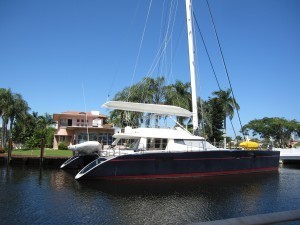
Unfortunately, the cat's out of our price range, but a fellow can dream, can't he? After all, I might win the lottery some day.
I know it's not just me. Our neighbor recently bought a dinghy so that he could go diving. He bought a used 5HP outboard the same day he brought home the dinghy. He took it out once and traded in the outboard for a 15 HP engine. Now, he's talking about selling the dinghy and buying something more along the line of a Boston Whaler. If he follows through with this plan, how long do you think it will be before he trades in the Whaler?
October 8, 2010
A Day in the Life of a Liveaboard Writer

Home, sweet home
The tune to the Beatles song "Paperback Writer" keeps running through my head only I'm singing, "Liveaboard Writer, Liveaboard Writer" as I'm making coffee in the morning and checking my email. I hear the bells of the 7th Ave. drawbridge and through the hull, I hear the rumble of a big engine. I check out the companionway into what I consider my front yard. Like clockwork, it's the Peterson Fuel Barge making his way downriver.
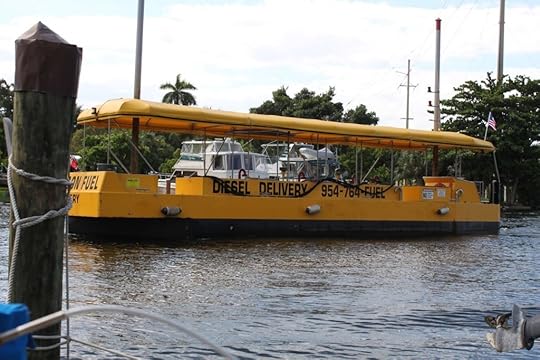 Back to the computer and the scene I'm writing.
Back to the computer and the scene I'm writing.
"She stood up and pulled herself up the companionway ladder until she could see through the dodger's windows to the sea ahead. Scanning the horizon as the boat crested a wave, she thought, no way a cruise ship could be that close and still not visible. Nothing. She climbed down the companion ladder and slid back into the navigator's seat.
Riley stared at the radar. The target was only about eight miles off now and closing at a speed close to fifteen knots. In this crazy sea. And they were definitely on a collision course"
Coffee is done. Time to sip a cup in the cockpit and watch the scenery.

Tug Hero very much like Seychelle's tug Gorda
Liveaboard writer. Back to the computer.
"She sat down on the cockpit seat on the low side of companionway and leaned her head back against the canvas dodger. Closing her eyes for just a minute felt so good. She was tired and the night was still so young. Riley realized she hadn't eaten a regular meal since that sumptuous feast on Niko's yacht just over twenty-four hours ago. Surviving off granola bars, trail mix and coffee was taking a toll. Her stomach was protesting with an acid burn. To make matters worse, this was her second night at sea, and she'd had only four hours sleep in the morning to make up for the lost hours. The body was like a machine that one had to keep well-maintained, and she knew she'd been treating hers badly. Too little sleep, too little decent food."
Speaking of food, I haven't had breakfast and it's nearly lunchtime. But there's the sound of another boat off my stern.

Sportsfish and crab boat
I see my friend the crab fisherman and I wave. The last commercial fisherman on Fort Lauderdale's New River. And so it continues, with me typing and checking the passing traffic every time I hear the bridge bells ring.
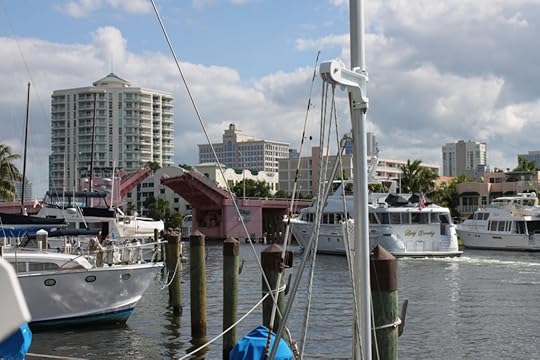
Fourth Avenue bridge
Until it's time to write dialogue and then I stand and walk around the cabin making the different voices of my characters, flailing my arms, acting out death scenes. And my audience appreciates every minute.

The Intrepid Seadog Chip
Liveaboard writer.
At the end of the day, a glass of wine to congratulate myself. Another scene written, and two revised.

Moonrise over Lauderdale
Liveaboard writer.
Fair winds,
Christine
October 6, 2010
Disruptions
By Mike Jastrzebski
I've mentioned in several of my previous posts that I'm working on a rewrite of my third book, Dog River Blues. Dog River Blues is a sequel to Key Lime Blues and I am trying to get the rewrite done so that the book will be ready to go live on or before Christmas.
and I am trying to get the rewrite done so that the book will be ready to go live on or before Christmas.
I usually do not suffer from writer's block, but my situation is rather unique. I live on a 36 foot sailboat and do my writing in the main cabin. This is also our living space and it is not a very big area. Here's a picture of my work space, it pretty much takes up our entire living area.
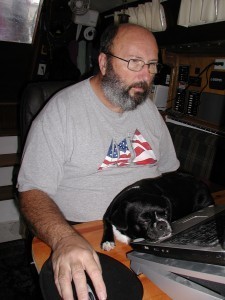
I do most of my writing while my wife, Mary, is at work. Usually I get a lot done. The problem right now? Mary's been off of work for the last three weeks. Mary hurt her back at work and also had knee surgery, so she's been home. In the past I might have given my blog writing partner, Christine Kling, a little ribbing about her taking time off to cruise and not getting as much writing done as she had planned. Never again.
You see, Christine travels with her partner, Bruce. It's amazing how hard it is to concentrate on the book when someone is moving around in the tiny space that makes up a sailboat cabin. Don't get me wrong. Mary tries to be courteous and quiet. But Mary has a hard time sitting still. She likes to be doing things. The dishes. Laundry-at least that takes her off the boat for awhile. She feels she has to clean the windows or reorganize the storage area behind the port settee. Get the picture?
So right now I'm not sure whether I should say I've been suffering from writer's block these last three weeks, of if I should call it spouse's block. Either way, the boat's a hell of a lot cleaner than when I'm home alone, and I'm barely able to squeeze out a page or two of rewriting every day.
How about you? What takes you away from your writing?
The Last Word
Last week, I typed the last word on my 'first final draft' of SEAsoned, my second yachting memoir/cookbook. To say I was excited would be to put it mildly. It was a Wednesday night at 12:30 pm and I was pushing through to finish. When the last scene was finished I danced around the boat to the latest Jack Johnson song that played endlessly on my IPod as I typed.
The next morning, I immediately hit the print button and packaged the 239 pages for my three beta readers. I had been reading chapters with my critique group all along and felt confident that it was just that last scene that hadn't already been re-written and polished. On my way to work, I dropped three large envelopes in the mail, smiling to myself. I would have a few weeks of free time before I received the first copy back. I could let the manuscript simmer away in a file and have a look at it with fresh eyes in a couple of weeks. That is what all the advice I had read said to do. Great!
That night, I picked up a book to read. For the first time in months, I ignored my computer. I didn't even sit in my favorite writing chair. This was going to be a vacation. I started reading and there it was, on page two of someone else's book, the perfect scene. It was fuller and more complete than one particular scene I had struggled with. This author got it. My mind whirled. If I added just two more sentences to my scene it would read better. I could tweak it and round it out like this author had done.
I lay the book aside, moved back to the comfortable groove in my writing chair and opened my laptop. I typed for four hours straight, fixing not only the scene I had in mind, but two others that I didn't even realize needed work until I saw how much better the scene flowed once I added to it.
I looked at my watch. Twenty-one hours—that's how long my vacation from the manuscript had lasted. But, it also got me thinking, what if I have another breakthrough next week, or next month? At what point is a book finished?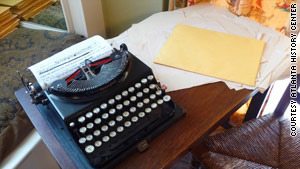
I looked to some of my favorite authors for an answer.
"I know it's time to send the manuscript out when I've done all I can think to do and need new eyes to help me get perspective. I write a lot of drafts, so sending it out is more about getting feedback than getting published. I'm done revising when my editor says to stop. It takes a few months for my brain to stop coming up with new ideas, and after that, it's such a relief to have the book out of my hands that I immediately start a new manuscript to obsess over."
Marjetta Geerling, author of FANCY WHITE TRASH, a 2009 American Library Association's Best Book for Young Adults
www.marjettageerling.com
 "I don't think the author ever has a good sense of when the project is ready…I always polish as much as I can and then share with a couple of trusted author friends whom I know will tell me the truth."
"I don't think the author ever has a good sense of when the project is ready…I always polish as much as I can and then share with a couple of trusted author friends whom I know will tell me the truth."
Joyce Sweeney, writing coach, manuscript critiquer and author of fourteen books, including THE GUARDIAN
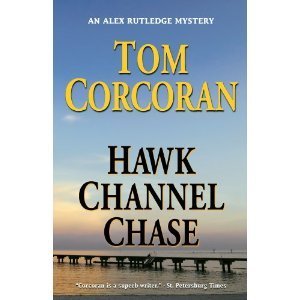 Each segment of a book, no matter how you measure it (chapter, scene, time period) must do its job in creating the whole. But, then, you must start by torturing each sentence and paragraph, getting the most effective work out of your words. Then the scenes must create momentum. It's a seat-of-the-pants feel you gain by being your toughest-possible critic. Only after you've whipped all the segments into shape can you judge the manuscript. Will more work do more harm than good? Do you risk changing the nature of your tale? Do you kick it out the door because you love it or can't stand the sight of it? All a matter of being a good reader – and believing that it holds up to the standards of the nastiest twelfth-grade teacher in the world. Finally, have you told a good story?
Each segment of a book, no matter how you measure it (chapter, scene, time period) must do its job in creating the whole. But, then, you must start by torturing each sentence and paragraph, getting the most effective work out of your words. Then the scenes must create momentum. It's a seat-of-the-pants feel you gain by being your toughest-possible critic. Only after you've whipped all the segments into shape can you judge the manuscript. Will more work do more harm than good? Do you risk changing the nature of your tale? Do you kick it out the door because you love it or can't stand the sight of it? All a matter of being a good reader – and believing that it holds up to the standards of the nastiest twelfth-grade teacher in the world. Finally, have you told a good story?
Okay, then, cross your fingers and give it its own life.
Tom Corcoran, author of six ALEX RUTLEDGE MYSTERIES
 With my first three manuscripts, I was like a not-very-confident baker with something in the oven: I'd peek, poke, and worry about when the book was "done." For my fourth mystery, the insistent buzz of the oven timer convinced me. Deadline was Sept. 15; I emailed the manuscript that day at 7 pm. Voila, done!
With my first three manuscripts, I was like a not-very-confident baker with something in the oven: I'd peek, poke, and worry about when the book was "done." For my fourth mystery, the insistent buzz of the oven timer convinced me. Deadline was Sept. 15; I emailed the manuscript that day at 7 pm. Voila, done!
Deborah Sharp, author of three MACE BAUER MYSTERIES. The series' fourth installment is "Mama Sees Stars," out in October 2011 — if Deborah's oven timer was right about the book being "done."
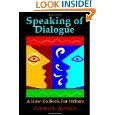 And from literary agent, Sammie Justesen, author of SPEAKING OF DIALOGUE
And from literary agent, Sammie Justesen, author of SPEAKING OF DIALOGUE
Ten ways to know your book is finished:
1. You've used all the material you can think of (for nonfiction), or come to the end of a riveting plot (fiction).
2. Because you know what your readers are looking for, you've included exactly what they want. If not, revise the book.
3. You rewrote sections of the book as needed. Keep in mind that the first few chapters – before you hit your stride – are probably the weakest.
4. You edited the book yourself, then had it edited by a qualified person. I strongly recommend hiring an editor.
5. The manuscript is correctly formatted and free of errors.
6. You've had several objective people (besides family and friends) read and critique the book. This is when writing groups are invaluable.
7. After letting the book sit for a few weeks, you read it again and evaluated all aspects.
8. While writing, you've been thinking how to market this new book. As the manuscript ages like fine wine, you formalized the marketing plan. This is not a dream plan, but a plan you can actually follow.
9. Nonfiction writers who plan to query an agent or publisher are working on a book proposal. Even fiction writers can benefit from a proposal, because it organizes your plan for the book.
10. You've taken heed of the following advice: "I went for years not finishing anything. Because, of course, when you finish something you can be judged. I had pieces that were re-written so many times I suspect it was just a way of avoiding sending them out." – Erica Jong
What about you? How do you know when your current WIP is ready to be sent out?
October 4, 2010
Marketing Yourself as a Writer
By Tom Tripp
What's the difference between a business with a good idea and a successful business? Well, a lot of things, actually, but for this post I'm going to focus on marketing. As writers, we have to market ourselves and our writing. It may seem obvious, but the most fascinating, compelling freelancer will fail utterly if no one ever finds out about her. Mike said that yesterday in his post on selling his books online.
This means that we need to spend some of our creativity selling ourselves and our work. There are almost as many ways to do that as there are writers who need to do it. For my freelance writing business, I had to accomplish two things — gain some name recognition and establish some credibility as an authoritative writer. Before I went freelance, I was NOT in the boating industry. In fact, my background was in the aviation and aerospace world. Fortunately, the job requirement there was to explain the science and technology of flying things to a public that didn't understand them.
At one point, after several years of high-visibility public and media relations work, Microsoft asked me to write the Encarta encyclopedia entry for "airplane." I didn't realize it then, but that would come in handy when it was time to reassure boating publication editors that I could successfully explain how new boating technology worked for boaters. That article reference is still on my "About" page and it still starts conversations, although Microsoft closed the last online encyclopedia website in 2009.
We've talked on this blog before about the importance of having your own website, preferably, in my opinion, in your own name if web blogging isn't already your business. Your website can have examples of your writing and will absolutely serve as your online resume. Your website is also where you will talk about the publications for whom you have written. You can update the list as the reputation of the pubs you write for increases, and as you add more of them.
Eventually, with persistence, you will assemble a portfolio that will itself begin to open new opportunities to market yourself. For me, that opportunity recently arrived with a nomination by my writing association (Boating Writers International - BWI) to serve as a judge at the annual International Boatbuilders Exhibition for the traditional innovation awards. My writing over the past couple of years had satisfied my colleagues at BWI that I knew the industry well enough and had garnered enough name recognition to satisfy the industry attendees of the same. I worked hard on those awards and I was proud to see my name and publication displayed on the opening slide at the awards presentation, which was attended by about a thousand of the key people in the boating industry. Despite the fact that attendees would have had to hand-write my web address, I saw a big spike in traffic to my website the very same day.
So make sure you're doing things to both expand your experience in your writing realm, and then use those credits to expand your name recognition. Finally, you're gonna have to get over the discomfort of talking about yourself. I grimaced all the way through writing this post, just as I do when I have to re-write my resume or my About page. I hate talking about myself. But I have to do it and so do you.
October 3, 2010
From Rags to Riches on the Kindle? The third month.
By Mike Jastrzebski
I have had my books on Kindle for three months now and I am beginning to see some patterns. The Storm Killer (261 sales in September) is outselling Key Lime Blues (197 sales in September) despite the fact that I ran a free book sponsorship for Key Lime Blues with the Kindle Nation Daily. To be fair, I did run a UK free book sponsorship for The Storm Killer, but for September I only sold 2 of each book in the UK.
(261 sales in September) is outselling Key Lime Blues (197 sales in September) despite the fact that I ran a free book sponsorship for Key Lime Blues with the Kindle Nation Daily. To be fair, I did run a UK free book sponsorship for The Storm Killer, but for September I only sold 2 of each book in the UK.
So far in October  The Storm Killer
The Storm Killer (27 sold) is again outselling Key Lime Blues (11 sold).
(27 sold) is again outselling Key Lime Blues (11 sold).
I believe that the reason for this is the reviews. Although the reviews for Key Lime Blues (6 reviews) have been mostly good, averaging 4.5 stars out of five. The reviews for The Storm Killer
(6 reviews) have been mostly good, averaging 4.5 stars out of five. The reviews for The Storm Killer have been fantastic. There have been 20 reviews with an average of 5 stars. 16-5 star reviews and 4-4 star reviews.
have been fantastic. There have been 20 reviews with an average of 5 stars. 16-5 star reviews and 4-4 star reviews.
I also received my first royalty check on September 30th for $189.15. This was for July ($185.15) and 3 days in June ($4.00). This was much better than I expected to earn when I put The Storm Killer on Kindle in June. My August check will be over $1000.00 dollars and my September check should be around $900.00. I will post the exact amounts when I receive them.
on Kindle in June. My August check will be over $1000.00 dollars and my September check should be around $900.00. I will post the exact amounts when I receive them.
I am making these figures available for those of you who are considering releasing a book on Kindle. I believe there is money to be made by self-publishing in this manner, but if you are thinking about doing this you might want to go back and read my early Rags to Riches posts. I want to make it clear that I have been working hard at marketing my books. I believe that if you are unwilling to make a concerted effort to market your books, it's unlikely you will make a lot of money at it.


